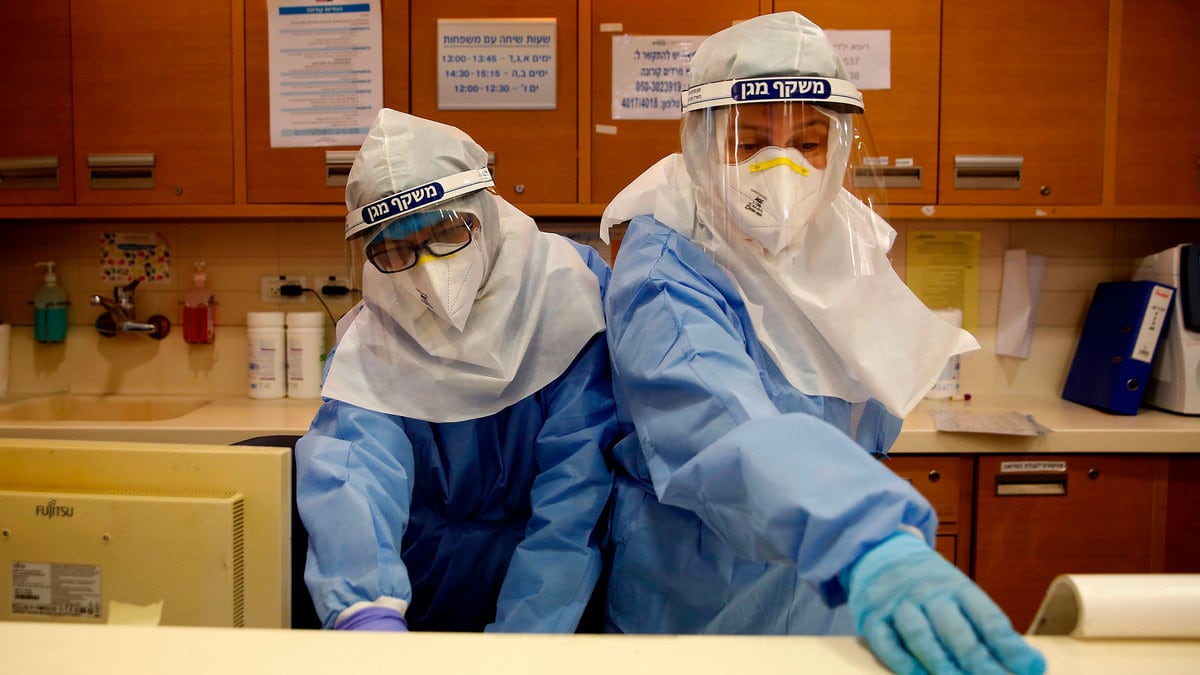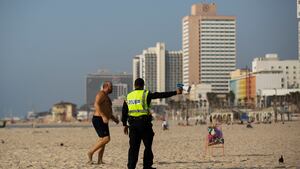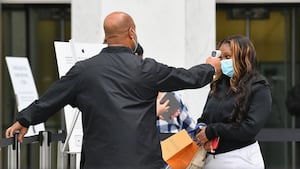Israel’s hospital system is overwhelmed and on a fast track to collapse, according to the nation’s top experts responsible for COVID-19 patients.
At an extraordinary press conference, Dr. Avishai Elis, the secretary of the Israel’s Internal Medicine Association, warned the public of an imminent disaster and the “tragic implications” of the paralysis which has taken hold of Prime Minister Benjamin Netanyahu’s government regarding the nation’s hospitals.
Two weeks ago, Israel became the first country in the world to impose a second nationwide lockdown, but there is no comprehensive policy in place to fight the novel coronavirus.
In a direct swipe at Netanyahu, Elis said the looming failure “has nothing to do with Excel charts and declarations,” adding, “It is difficult to believe the Israeli government has yet to even discuss the matter.”
His grim assessment of Israel’s trajectory has direct bearing on the second wave of coronavirus contagion beginning in the United States, where hospitalizations have also stopped declining and may be rising again.
In Jerusalem, Netanyahu and his ministers wrangled over his efforts to outlaw public protests as Israel broke a new record on Thursday, with 9,015 confirmed cases of COVID-19 in 24 hours.
Netanyahu appears to be incensed by the growing rallies against him. Contradicting his own health ministry, he has called the demonstrations “incubators of disease.” The controversial emergency measure limiting the right to protest commandeered parliamentary deliberations on Thursday, and, if passed, will have to be renewed week by week.
Seated beside Elis, Dr. Hagith Yonath, chief of internal medicine at the Sheba Medical Center, near Tel Aviv, accused the government of using the besieged hospitals for good P.R. by announcing funding for urgently needed new staff—when the staff does not exist.
For every coronavirus ward opening up, she noted, a non-coronavirus ward closes. There are not enough doctors to operate both. Patients who would otherwise receive top-notch care were being discharged early and “in the coming months hospitals will be forced to make unimaginable choices,” she said.
The Health Ministry announced on Thursday that due to shortages, it is experimenting with the reuse of PPE for medical staff in hospital COVID wards.
Hospital directors were also incensed by the Health Ministry’s refusal to provide doctors with flu shots from the first batch that arrived in Israel— advising them to wait till November—and by the ministry’s lack of transparency regarding contagion.
Dr. Tamy Shohat, a professor of preventive medicine and epidemiology at Tel Aviv University’s medical school, described her failed efforts, during the first wave to obtain raw data collected by Israeli authorities. “Today,” she said, “the situation is so desperate. We had 9,000 positive cases today. Where did they test? In which neighborhoods? Only among the ultra-Orthodox? Among people exposed to someone with COVID-19? All Israel? It is impossible to understand anything from this.”
“We are on the front lines,” Elis said. “We are the generals and the soldiers in this battle. This is a report from the field. Not a statement by so-called experts.”
He is not the first to raise an alarm the government has appeared to ignore.
On Sept. 22, Hebrew University professor Yinon Ashkenazy warned the authorities that Israel would cross the red line of 800 acute COVID-19 patients by the end of the week, meaning all the nation’s hospitals would be at full capacity.
His prediction was borne out. On Thursday, Israel had 812 COVID-19 patients in critical care, with the figures mounting.
Ashkenazy, who heads the Racah Institute of Physics and is an authority at gauging the contagion’s progression, said in an interview that “acute sickness will go up sharply in the coming weeks. We know that for the next two weeks, the spike will continue, severely worse between October 10 and 16, with higher mortality.”
The government has yet to legislate to give critical backing for hospitals. Instead, in recent days, Israelis have been treated to the surreal spectacle of the government’s top health advisers dismissing as worthless the very measures being enacted by the government they advise.
On Thursday, Deputy Health Minister Yoav Kisch admitted to a committee of the Knesset, Israel’s parliament, that there was no public health benefit to the onerous lockdown. The prohibition on intercity movement, he said, was not needed to control the contagion, but served to impede fraudsters. “Public health regulations also allow us to work in factories and in tech,” he explained, “but we forbid it. Car travel opens a Pandora's box. If we let people go out—it will be taken advantage of by all sorts of cheats.”
A few hours before him, Dr. Sharon Alroy-Preis, Israel's head of Public Health Services, caused an uproar when she said in a radio interview that the reason Israelis were prohibited from traveling abroad was not related to public health, but “for equality, between people who can afford to travel and those who are stuck at home under lockdown and can’t.”
Netanyahu’s opponents attribute the lack of a coherent government strategy to an inherent conflict of interest. Netanyahu, they say, is incapable of controlling the crisis because he is on trial, politically damaged and beholden to the narrow interests of his coalition partners—especially parties representing the ultra-Orthodox Jewish public, less than 10 percent of Israel’s population, but the locus of 40 percent of COVID-19 infections.
Netanyahu was charged with bribery, fraud and breach of trust last year. The trial opened in May, amid his angry claims that he was the victim of a conspiracy woven together by the police, the judiciary, and “the leftist media.”
Yair Golan, a legislator for the left-wing Meretz party, charged on Thursday that “the only aim of the [coronavirus] restrictions is to stop Netanyahu's trial.”
As if on cue, hours later Jerusalem’s district court granted Netanyahu’s attorneys’ request for an extra 40 days to respond to the indictments, a move likely to postpone all the hearings.
In what is expected to be the last massive demonstration until the draconian anti-protest measures are lifted, or are nullified by the courts, thousands marched through central Tel Aviv late Thursday chanting: “The defendant must go!”
There is no evidence COVID-19 has been transmitted in the outdoor protests, but the bill under consideration by the Knesset limits citizens to a 3,200-foot perimeter from their homes and bans any outdoor gathering of more than 20 people, ostensibly to safeguard against infection.
Support for Netanyahu has cratered and the Israeli public has largely switched off since July, when the second wave of coronavirus, which is still raging, hit Israel like a tsunami.
Following the effective handling of the pandemic’s first wave, its resurgence came a short two months after the government shambolically reopened schools, lifted constraints on massive public gatherings, and Netanyahu urged Israelis: “Enjoy yourselves. Have a beer.”
Hospitals and other institutions are scrambling to contain the damage and upgrade capabilities.
On Thursday, for the first time in Israeli history, the army announced that military medical personnel will treat civilians in two coronavirus wards it will open at Haifa's Rambam Medical Center.
Rambam, the largest hospital in Israel’s north, is among the best-prepared medical centers. Last week, in anticipation of the oncoming onslaught, it opened its Fortified Underground Emergency Hospital for the first time since it was built, in 2014, originally with the aim of protecting patients from incoming Hezbollah missiles located in nearby Southern Lebanon.
Hidden 54 feet underground, the bomb-proof bunker has 770 beds, including 170 adapted to patients on ventilators, and is now Israel’s largest dedicated coronavirus treatment center.








